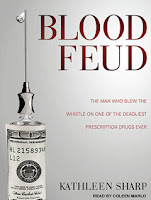 by Kathleen Sharp.
by Kathleen Sharp.Book Review on Center for Medical Consumers web site.
While this is a recurring theme, Blood Feud tells a story we all need to be reminded of. Big PhRMA is about profit not patient good. The point is: caveat emptor. The public is at risk when drug companies fight for market share.
An African proverb holds that "when elephants fight, it's the grass that suffers." This is underscored by the struggles of PhRMA giants Amgen and Ortho-Johnson and Johnson to capture the market share of Epogen and Procrit.
Blood Feud is a sobering story. A similar tale was told in "Pain Killer: A Wonder Drug's Trail of Addiction and Death" (2003) by Barry Meier that deals with Oxycontin.
This book is a thorough expose of many of the dirty tricks played by PhRMA as it pursues is goals of profit over patients' well-being. No one is allowed to stand in PhRMA's way..




